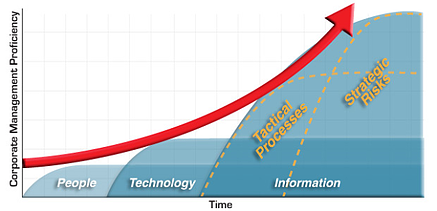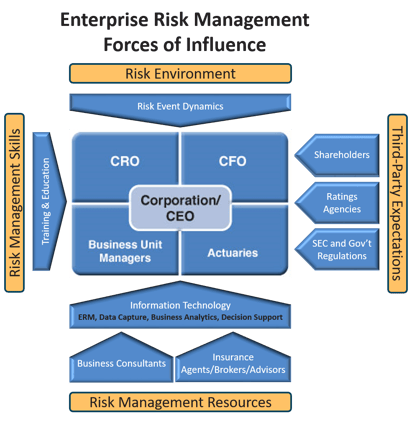Business management concepts trace back to ancient Egypt and to General Sun Tzu’s “The Art of War” in the sixth century BC. Accounting practices also existed since early civilization, but business management as a discipline is a relatively new concept that took hold near the turn of the twentieth century.
After Henry Towne and others laid the groundwork for the science of management in the 1890s, early classical management theorists included Frederick Winslow Taylor, who studied workflows and published “The Principles of Scientific Management” in 1911, and Henry Foyal, who developed a functional view of management and published “Administration Industrielle et Générale” in 1916.
Management theories evolved throughout the twentieth century, but as recent advancements in accounting disciplines, data collection, and data analytics have joined the mix, the science of business management is at the forefront of a new phase.
Early management concepts in the modern era focused on people-centric business processes and later turned to technology as a source for operational efficiency improvements. Now we are in the midst of the Information Age, a period when the ability to manage information determines the success of companies. The competitive stakes are growing as corporate management proficiency is accelerating.
In the Information Age, we are embedding the science of business management in corporate technology systems and standardized business processes.
Delving more deeply within this current management discipline wave, data acquisition and analysis until recently have focused mostly on closed-system business processes and tactical workflows to improve organizational efficiency piecemeal. Meanwhile, efforts to improve overall corporate management efficiency have achieved limited success.
IMT believes this is about to change.
Business management trends within the Information Age are fundamentally shifting toward better managing and leveraging enterprise risks for strategic differentiation and organizational success.
Risk management has long been a core management concept in the financial management, banking, and insurance sectors, but is now gaining traction across industries and across business units within corporations. Business decision makers, shareholders, and regulators acknowledge the benefits of effective risk management, but where do business leaders turn when they want to assess and manage their top corporate challenges and risks? Typically, they rely on a variety of experts and products that may include CFOs, general counsels, actuaries, business  consultants, business analytics software, corporate dashboards, insurance advisors, and insurance brokers, among others.
consultants, business analytics software, corporate dashboards, insurance advisors, and insurance brokers, among others.
In the past two decades, pioneers of new management concepts have established a Chief Risk Officer role to help assess and develop enterprise-wide risk management plans from a boardroom perspective. While highly successful in some cases, many in this profession have been disappointed by the sluggish acceptance of this management role in the broader market.
The underlying challenge is risk management is not a role or a product, but is instead a business discipline that should be embedded throughout the many layers of enterprise decision making processes.
IMT believes we are at the early stages of implementing risk management as a core business discipline applied across enterprises. The discipline is now supported by a perfect storm of business management trends advancing the processes and technology for data acquisition, business analytics, and decision rules that elevate the science of corporate management with risk optimization.
IMT researches and analyzes current trends in business management that support improvements to enterprise decision making efficiency as a discipline. This includes analyzing current business trends from the following perspectives:
The combination of advances in business school risk education, risk data sources, information technology, actuarial science, risk consultant advice, and insurance advisory services is vastly changing business management discipline today. Collectively they will break down the barriers of organizational silos and politics that have been preventing more effective assessments and management of corporate challenges.
As the digitization of corporate information grows exponentially, the IT products and applications in development today will enable companies to better meet the rising risk management efficiency expectations of shareholders, industry standards, the SEC, and other regulatory agencies.
Intelligent Management Trends analyzes and reports on the latest management concepts, education, actuarial science, services vendors, technology vendors, and risk information sources that are carrying us forward to the next crest of business management proficiency.
Business success is based on the ability to marry the best of managerial science with entrepreneurship and ingenuity. Stay ahead of the curve by integrating risk management solutions and best practices for decision making processes to overcome your challenges to achieving organizational objectives.
If you are a service, software, or information vendor, make use of IMT's industry research products and custom consulting services to identify and best position your organization for market opportunities. If you are an enterprise, engage with IMT and our community to help advance the science of business management.
IMT offers a wide range of custom research consulting services for vendors, enterprises, and others interested in advancing risk-informed business decision making. Reach out to us to discuss your organizational challenges and how together we can hel padvance risk management as part of organizational decision-making proficiency.
Our blog title urges the demise of business decision making based on static assumptions. Corporate objectives and decision making should be grounded in risk management principles bolstered by technology advances, real-time information sources, and analytics in today's dynamic business environment. Read our market insights and opinions on current management trends and vendors advancing the science of decision making to achieve corporate objectives.
© 2026 Intelligent Management Trends. All rights reserved.